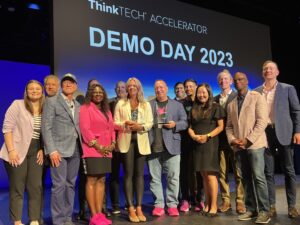Six fintech companies pitched community bankers on how their solutions can help immediately attract and retain deposits and spark real-time payments innovation during the Independent Community Bankers of America’s ThinkTECH Accelerator Demo Day.

This year’s cohort included:
- CNote, which helps banks invest capital into underserved communities at scale. The Oakland-based fintech deploys investor funds into deposit and loan products through a network of more than 2,000 equity-focused community financial institutions.
- Micronotes, a cloud-based marketing automation company which allows banks to use data to execute on loan, deposit and retention opportunities.
- Spiral, an impact-as-a-service platform which helps banks increase customer engagement and retention through socially conscious spending.
- Finli, a digital bank-office solution for customer resource management, payment collection, invoicing and communications.
- Neural Payments, a payment engine which moves money over traditional debit rails, P2P payments and RTP systems.
- Pidgin, a platform that supports faster payments via an administrative portal, user-focused front-end applications and developer-friendly APIs.
Demo Day took place June 28 after the companies developed their solutions during an intensive, 10-week program. Each fintech was given seven minutes to pitch their ideas. ICBA announced the selection of the six fintechs in early April.
“ICBA commends the cohort for their dedication and purpose-driven solutions that support community bank innovation and lights the pathway for further collaboration with our industry,” said Chief Innovation Officer Charles Potts. “We continue to be impressed by these companies and their solutions, which are thoughtfully and purposely built to address the unique needs and business opportunities of our members in service to their customers and communities.”
Spiral was awarded the Most Valuable Participant as the “most-evolved offering based on program engagement and alignment with community bank business priorities.”

Founded in 2019 by fintech entrepreneur Shawn Melamed, the New York-based fintech has raised at least $42 million over the last four years. The platform helps banks to incorporate ESG, social impact and sustainability into their cores by offering social-impact-driven bank accounts, debit cards and credit cards. Melamed also sees his fintech as helping community banks attract younger demographics, which currently disproportionately bank at the largest institutions. Banks that adopt the platform saw a large increase in monthly card transactions in the first 90 days and a 30 percent rise in digital engagement, Melamed said.
Neural Payments secured the Audience Choice Award as the most promising solution. In February, the Cincinnati-based fintech announced it had raised $8 million in Series A Funding to invest in sales, marketing and engineering. During her pitch, Executive Director of Client Experience Melissa Kopp said banks must respond to the substantial increase in deposits at nonbanks such as Venmo and PayPal. To her, community banks have an advantage in financing consumer purchases for everyday items and larger, ‘buy now, pay later’ payments. “P2P is your micro opportunity,” Kopp said.
Barãta Bey, director of community finance at Oakland-based CNote, pitched his organization as enabling banks to have sticky and frictionless deposits while improving their HMDA and CRA initiatives. The fintech has already steered more than $300 million in community development funding to businesses in historically underbanked areas through community lenders, he said.
Last September, CNote raised $7.25 million in an oversubscribed Series A investment round. “We’re addressing a massive systemic problem with a market-friendly platform that has already been adopted by forward-thinking corporations and other institutions,” said CEO and co-founder Catherine Berman following the fundraising round. “By pumping hundreds of millions of dollars into undercapitalized communities, CNote is activating corporate dollars for systemic change while minimizing risk.”
Finli CEO Lori Shao, who founded the payment management platform in 2020, pitched her company as offering banks the chance to reduce deposit leakage while increasing net interest income. The Los Angeles-based fintech leverages receivables information to risk-assess SMB customers’ credit worthiness; month-over-month growth in invoice volume and dollars processed. She said her fintech’s mission is especially important as more bank customers expect more from their financial institutions and embrace neobanks which already offer those services.
Banks that don’t implement faster payment systems put themselves at risk of creating a cost center instead of a new source of revenue, said Pidgin CEO and Founder Abhishek Veeraghanta. He sees competitors such as Zelle, Cash App and Venmo as targeting customers with those solutions. Atlanta-based Pidgin offers payment closing times of under 20 seconds, he said, and includes an administrative dashboard with customer email addresses, mobile numbers and detailed payment history.
Parker Steed, vice president of sales at Boston-based Micronotes, said the fintech applies machine learning to customer data to increase engagement and effectively sell more financial services — merchant services, credit cards, loans and ACH origination. Founded by tech entrepreneurs from the Massachusetts Institute of Technology, Boston-based Micronotes serves approximately 140 community banks.
The second day of the event included 15-minute breakout sessions and office hours with the cohort, allowing community banks to learn more about the solutions. Hosted in Atlanta, the ThinkTECH Accelerator was the first since the ICBA brought the program in-house last year. As part of the rollout, the association established an office space in the city to build year-round innovation programming and host two accelerators every year.
The Accelerator Program began in 2018 with an initial cohort of approximately 60 bankers and nine fintechs. In the next five years, 44 fintech companies participated in front of 1,200 bankers. The cohort now includes 240 corporate members and 24 preferred service providers. This year’s Demo Day included approximately 325 banks and a dozen venture capitalists, said ICBA Senior Vice President of Innovation Programs Wayne Miller. He noted that a majority of banks followed up with presenting fintechs.
The ThinkTECH Accelerator is expected to begin in September and focus on small business solutions and data analytics needs. “As we grow and evolve the program, we will continue to build on this program’s foundation to foster these critical community bank-fintech partnerships,” Miller said.
